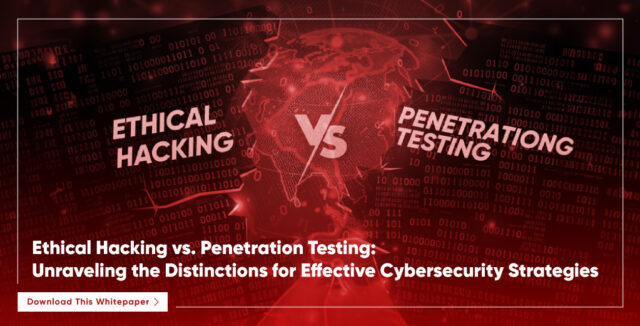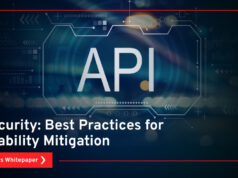
The whitepaper begins by exploring ethical hacking and penetration testing methodologies, objectives, and scopes. It highlights that ethical hacking embraces a holistic and comprehensive security strategy by proactively pinpointing vulnerabilities within a system and conducting authorized simulations of real-world cyberattacks to uncover and rectify security weaknesses. In contrast, penetration testing concentrates on evaluating the security measures of a specific, designated component within the system by attempting to exploit identified vulnerabilities and gaining unauthorized access to gauge the potential impact.
Two key insights from the whitepaper include:
- Ethical hacking and penetration testing serve different purposes: The whitepaper emphasizes that while both ethical hacking and penetration testing aim to identify vulnerabilities, ethical hacking takes a holistic approach by simulating real-world attacks, allowing organizations to strengthen their defenses throughout their network. In contrast, penetration testing exclusively focuses on calibrating the efficiency of current security measures and uncovering and exploiting any overlooked vulnerabilities within a specifically designated section or application within the network.
- Legal considerations play a crucial role: The whitepaper highlights the legal implications associated with ethical hacking and penetration testing. Ethical hacking requires explicit permission from the system owner and adherence to legal and ethical guidelines. Penetration testing also requires proper authorization, and organizations must ensure that their actions comply with laws and regulations to avoid legal consequences.
Organizations and professionals can make informed decisions regarding their cybersecurity strategies by understanding the distinctions between ethical hacking and penetration testing. This knowledge can help strengthen an organization’s security posture by identifying vulnerabilities and implementing appropriate measures to mitigate risks.
Additionally, the whitepaper includes a case study that illustrates the practical application of ethical hacking and penetration testing. This case study provides real-world examples of how these practices can be employed to identify vulnerabilities, assess the effectiveness of security measures, and enhance an organization’s overall cybersecurity.
Overall, “Ethical Hacking vs. Penetration Testing: Unraveling the Distinctions for Effective Cybersecurity Strategies” offers valuable insights into the unique purposes, methodologies, and legal considerations of ethical hacking and penetration testing. By leveraging this knowledge, organizations can develop robust cybersecurity strategies that effectively protect their systems and data from cyber threats.
About the Author
Jagdish Mohite
Principal Security Consultant at Akamai Technologies
OSCP, OSWP, CRTP, CISSP, CISA, CEH, CHFI, PMPJagdish Mohite is an experienced Cybersecurity Professional with 20 years of experience working for Akamai Technology as a Principal Security Consultant. He holds a Master’s degree in Cyber Security from Purdue Global and has multiple certifications, OSCP, OSWP, CRTP, CEH, CISSP, CHFI, CISA, and PMP. Jagdish earlier worked on various international engagements and was in Germany and Sweden for a few years. His work extensively contributes towards securing Web Applications and APIs; he is good at malware reverse engineering. Jagdish is based in the beautiful mountain state of Colorado in the USA.










